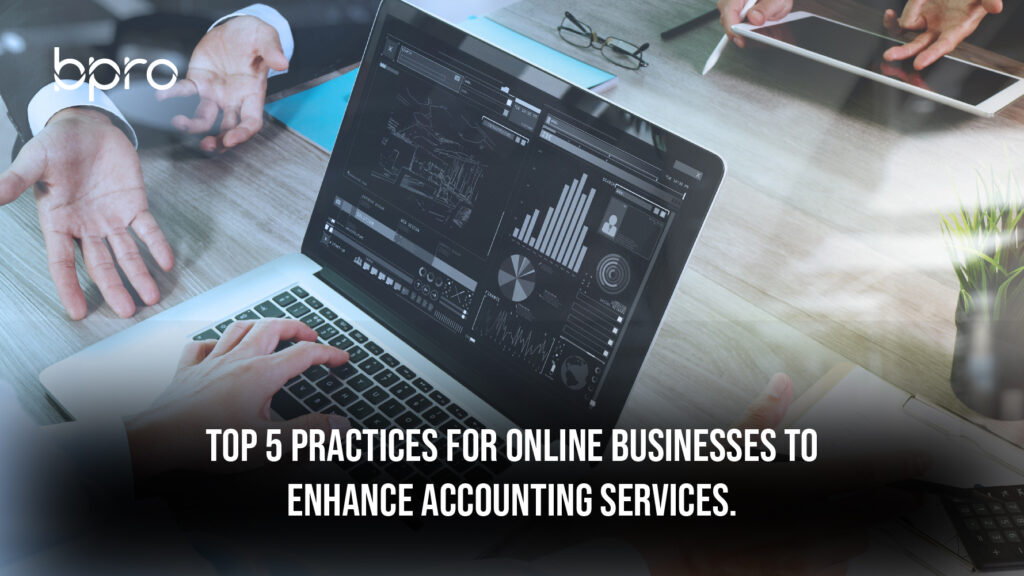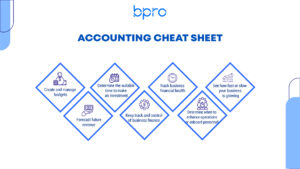The coronavirus pandemic has brought adverse problems for industries, yet it has been lucrative for online businesses. Digital companies were able to take the benefits of new norms and attracted a large number of online buyers. Taking the example of the e-commerce industry, the online marketplace has experienced a tremendous boost in recent years as physical stores were forced to remain closed. On another hand, this also opened a window for new challenges because critical back-office operations, such as accounting services may not be able to keep up with the pace of the increase in business volume. Online businesses are widely known for having a large number of daily transactions, especially in this global pandemic situation.
That’s the reason why online businesses need to pay attention to the below accounting practices in order to remain competitive in this fast-growing and digitizing world while overcoming the accounting challenges that could become hurdles to business success.
Importance of Accounting for Online Businesses
Digitization and internet transformation have changed business working while redefining their models. As online sales continue to increase and old-school business models are being threatened by online firms such as eBay, Amazon, Alibaba, and much more. In addition to this, the US accounting industry generated over $110 billion in revenue in the previous year.
Accounting systems are considered one of the most critical as well as essential parts of every business as both go hand-in-hand. It's the detailed and systematic recording of a company’s finances that helps owners, vendors, investors, etc. in making informed decisions at the right time. However, if businesses lack robust accounting or don’t pay focus on financial management operations, then it will become quite hard for the teams to assess the company’s financial position and other important information. Assessing the business finance helps them to understand in which direction the firm is going - success or bankruptcy. Additional good accounting operations assist in recording, maintaining, classifying, and summarizing the transactions.
Online business success totally depends on its accounting systems, as it's the only way of getting hands-on accurate, and reliable key performance information about the company. However, when running an online business, owners need to be able to measure a business's financial standing in real time, including the effectiveness of other functions too. In return, this will, fortunately, help enhance productivity while increasing the profitability of the business by determining the product or key area to focus on. Furthermore, automated accounting solutions will also allow businesses to get answers to their questions, about which products will sell the most. What would be the logistics cost? And much more. Thus, it's essential for online businesses to enhance their accounting and bookkeeping systems, either hire professionals or get it outsourced, but must have good accounting management in place to succeed in this fast-moving world.
Top 5 Accounting Practices For Digital Businesses
1) Separate Business and Personal Finance
Online business owners need to ensure that they or their employees are not purchasing goods for personal use with business finance. If the funds are not distributed accurately, it will, fortunately, impact the cash flows, and increase difficulty in tax filing as well as additional auditing complications. This may also result in legal consequences where businesses can lose limited liability if owners show sluggish behavior in keeping the business and personal finance separate. In the case of small or online businesses, owners need to handle the sale/purchase as well as payments. Even though there is only one person watching funds, businesses always need to keep business and personal finances separate.
Open a completely separate bank account as well as credit cards. Automated accounting and tax services will not only help at the time of tax filing but also overcome the risk of accidentally forgetting to use business finances for personal use.
2) Integrate Accounting Systems With Online Store
One of the most critical things all digital businesses need to have is getting automated accounting solutions that can synchronize with the in-house control system. This will save the time that was required to log all business transactions manually. Moreover, this also helps to overcome the risk of false or error-prone entries during the updating procedure. However, online business owners need to categorize their firm’s transactions into expenses and income. It's significant to keep an eye on the cash in and outflows. Separating them will automatically reduce the time of making daily audits to know how many resources are left behind.
3) Reconcile Account Regularly
During the selling, purchasing, and shipping of the products or services, there could be varieties of instances including, errors in some transactions or being charged twice by the bank. To overcome the risk of such uncertainties, online businesses need to ensure that their bank accounts match with the records logged on business accounting systems, which can help to determine the problems in transactions, track where credit or debit cards have been used along with getting know if they have been processed properly or not. To do so, the financial management team needs to make regular audits to determine the reasons for the imbalance and act accordingly to overcome the chance of getting bankrupt. However, accounting solutions allow businesses to automatically create reconciliation reports at the month's end.
4) Plan for Taxes Throughout the Year
Online businesses need to get their accountants in touch on a regular basis to make sure that tax-related things are streamlined and maintained on a monthly basis. This will help to organize the business books and make it easy to get viable information out of them instantly. However, having accounting and tax services will also back businesses making strategic decisions throughout the year which will automatically reduce the hassle of filing taxes and avoiding non-compliance fines.
5) Prefer Cloud Computing Software
While owning or running a business, it's hard to determine when previous accounting records need to be relooked at. No matter whether the old data is needed, it's essential to maintain business financial records for the long term. However, if it's done manually there is a greater risk of missing any entry which can lead to a bigger problem in the future or put business credibility at stake. But if businesses have cloud-based accounting software, they don't need to worry about data loss as each transaction and daily activity are securely saved over the cloud. According to Goremotely, 94% of accountants have adopted cloud accounting. However, these innovations allow online businesses to access data anytime anywhere without any hassle of exploring physical databases.

